The Battle of Hong Kong began on 8th December, 1941. My father was one of the brave soldiers that fought the Japanese invaders. In his honour and that of the others who fought, died and survived the most terrible hardships, I am reposting this article:
Dad, the invasion of Hong Kong and prison camp
The Japanese invasion of Hong Kong started on the 8th December 1941 and lasted for 17 bloody days until the British forces, surrendered on the 25th, in the person of His Excellency the Governor, Sir Mark Aitchison Young.
Dad, as did all men over the age of 18 in Hong Kong, joined the Hong Kong Regiment and had to report to camp once a month and once a year for a two-week camp. These camps were not particularly onerous as they were piled into a truck and driven out to some location in the New Territories where a contingent of coolies would carry their kit bags up to the camp site. Their equipment also consisted of a wind-up gramophone and a box of 78s, several crates of beer and other necessities of life.
They would set up their billets and report for machine gun practice with the water-cooled Vickers Machine gun, about which, more later. Practice consisted of spotting the enemy, which was usually a collection of bone pots and blasting them to pieces. Eventually the indigenous villagers complained of this to the government and they had to find other enemies to practice on.
As the war came closer the volunteers were given training in anti aircraft guns and as it was believed that the attack when it came, would be a night time attack, they were called out at all hours of the day and night to man the guns.
As a child, growing up in Hong Kong I remember hearing the air raid sirens which were still in place at late as the early sixties. The government continued to test them on a regular basis and I still remember the feeling of unease whenever I heard one go off.
Finally it was December 1941 and despite the impending war it was still the Christmas season. On the evening of the 7th Dad was attending a black tie function complete with dinner jacket and cummerbund. It was early the following morning that the sirens started wailing. Several inebriated gentlemen shrugged off the alarm as yet another drill and it was not until the bombs actually started falling that my father and his team manned their anti aircraft gun, still wearing their dinner jackets. The war had finally caught up with Hong Kong.
There are numerous websites dedicated to the fight for Hong Kong so I will not go into that here. Dad was trained as a signalman and as the defending forces fell back he eventually found himself in Stanley along with the remains of the British forces. On one occasion he was ordered to deliver a message on his motorcycle. He set off, delivered the dispatch and was returning when a Japanese mortar shell knocked him off his bike. Stunned and grazed but relatively unhurt he returned to the lines where, due to water rationing, his wounds were disinfected with cherry brandy. He told me later that he would much rather have drunk it.
The fighting was fierce and the invading Japanese soldiers hurled themselves at the defenses. Thousands of them were killed and Dad told me that at one location their bodies lay three deep outside the perimeter wire. The Vickers machine guns that they had trained with in the hills of the New Territories were nurtured carefully by the volunteers. The belt ammunition passed up promptly and the cooling cylinders refilled routinely as the water boiled away. Eventually the fighting was so fierce that there was no time to refill the cylinders and the volunteers fired on, expecting the barrels to melt down or the mechanism to jam. However, the weapons never let them down.
Hong Kong surrendered to the invading forces on Christmas day, the 25th December 1941 but not before, on the same day, Japanese soldiers forced their way into the British field hospital at St. Stephen's College where they tortured and killed over 60 injured soldiers and raped the medical staff.
After the surrender the Volunteers were imprisoned in various locations. Dad was sent to the Sham Shui Po POW camp.
(In 1969 when I started my apprenticeship at China Light & Power I was sent to the training school which at that time was in the Sham Shui Po depot. Each morning I had to walk past the British Forces REME camp. It was the same spot where the POW camp had been situated.)
Dad and his companions settled down to life in prison camp having no idea how long they would be there. People reacted differently to their incarceration and many years later Dad told me that there were many that just lay down and died. Others, like Dad made the best of a bad deal and he soon had a little business going darning socks with knitting needles that he had made from barb wire. It was not long before the prisoners started resembling the living skeletons so vividly depicted in photographs taken by the relieving forces and their daily diet was supplemented by grasshoppers, which Dad collected out of the surrounding bushes. They were boiled and added to the meagre portion of rice that they lived on.
The cruelty of the Japanese guards has also been well documented and I do not intend to dwell on it here. When the prisoners assembled every morning they were forced to kowtow three times to the emperor. On one occasion Dad refused and was beaten about the back and shoulders with the flat of a samurai sword. And then on another occasion when Dad was scrounging grasshoppers near the fence he was approached by a Japanese officer. Dad bowed deferentially and backed away but the officer motioned him closer. Dad of course obeyed.
“What do you want? Is there something you need?” asked the officer. Fearing a trap Dad stood there unable to speak.
“Quickly,” said the officer.
“Bread,” said Dad. No really knowing what else to say.
The officer moved away and Dad shuffled back to the barracks, grasshoppers forgotten.
It was three days later that Dad was out foraging again. He was unaware of how long the officer had been standing there watching him but heard a gentle cough. There was the officer on the outside of the fence. It was winter at the time and the officer was wearing a long coat. He looked about to make sure that no one was watching and then tossed three small loaves of bread over the fence before quickly moving away.
Dad never saw him again.
This was the story from my mother's perspective:
Discussions with Mum
When I was a child, like all children I went through an inquisitive phase and no drawer or cabinet was safe from my prying eyes and hands. I recall looking up in awe at my father’s Masonic regalia as it hung in his closet, ready for his next meeting, wondering what possible occasion might require the wearing of such things.
It was during this period that I happened to go through my mother’s drawer in the camphorwood chest that we still have in the family. Among the bits and pieces there were two items of interest, seven manicure sets and a five hundred dollar note the size of a face cloth. It wasn’t until many years later I asked my mother about these items.
It was after my father had passed away from a year-long struggle with stomach cancer and Mum was staying with us for a few days. She became very withdrawn and my wife and I did everything we could to keep her busy. Mum was very fond of our son, James and he did his bit to keep her running about after him. It was during this period that, completely out of the blue we started talking about her early days in Hong Kong.
Mum, Jean Miller Whyte, had come to Hong Kong in the early 30s with her parents who were brought out to the colony by the Royal Naval Dockyard. Like my father, Mum went to the Central British School in Tsim Sha Tsui which was the forerunner of King George V. The building may still be seen on Nathan Road as it is one of the few ‘listed’ buildings in Hong Kong and is, I believe the Antiquities Office.
My father, Charles McConnell Sloan was born in Hong Kong in 1914, the son of John Sloan, an employee of the Taikoo Sugar Refinery. After completing his education he joined what was then the Hong Kong Motorbus Company as an apprentice, where he assured me, he spend his first year learning how to make tea and sweeping the workshop floor. When they thought they could actually trust him with anything more complicated that a broom they put him on the night shift with an older apprentice. His work on these shifts, when he wasn’t making tea or sweeping the floor, was to help prepare the buses for the next day and go out with retrieval team and bring back any buses that had broken down.
When my father and the retrieval team arrived they found the body of the person that had been hit, still underneath the bus. Apparently he wasn’t a local resident so no one had bothered to come and rescue him. They pulled the body out from under the bus and deposited it inside, managed to start the engine and drove off. They didn’t get far. One of the locals had heard their arrival and came out to investigate. With no street lighting and the headlights of the bus being smashed, they didn’t see this black clad gentleman and knocked him over. They leapt out of the bus to find him alive, but unconscious on the ground. Quickly, before anyone else came to investigate, they placed him in the bus alongside the corpse and drove off as quickly as they could.
My father went on to become one of the first Rolls Royce qualified engineers in the Far East and finally retired from, what was then Gilman Motors, in 1972.
Mum and Dad were married in 1939, not really an auspicious year. Following the wedding and a night of nuptial bliss in the Hong Kong Hotel (which incidentally was at the foot of Pedder Street in Central in those days), boarded a Blue Funnel Steamer headed for England and their honeymoon.
After six weeks of travel via Singapore, Malacca, Penang, Port Said, the Mediterranean and Gibraltar they finally docked in England completely oblivious of the fact that World War II had broken out. My father was given the opportunity of staying in the UK and joining the British Army or returning to Hong Kong and the Hong Kong Volunteers, which he was already a member of. As their lives and family were in Hong Kong they decided to return.
They enjoyed almost two years of peace before the war caught up with Hong Kong in December, 1941. By then Mum had been evacuated to the Philippines and from there to Australia. During that time my brother Jim was born and he was almost five before he met his father for the first time.
I don’t want to go into the hardships they both endured during those years; that is for another day, but whilst Mum was in Australia, Hong Kong fell to the invading forces and my father was eventually sent to Japan as slave labour. At the end of the war he and his fellow prisoners were flown to the Philippines in stripped out bombers and from there to Canada where he travelled across that country by train to the east coast. From there he was transported England to be reunited with his family.
It was while Mum was telling me this that I remembered the manicure sets and the enormous five hundred dollar note in her drawer. Dad, she told me, was never the most romantic of husbands and could never think of what to buy her for her birthday, so every year he bought her a new manicure set. The five hundred dollar note, she told me, was her ‘escape money’. She had never forgotten having to leave Hong Kong with only what she could carry.
| Thanks to Stewart for sharing his family's history with us. The Gwulo website has several other accounts of life in Hong Kong, both in war and in peace. If you can add any accounts from family or friends, they will be very gladly received. Please contact David with details:
|
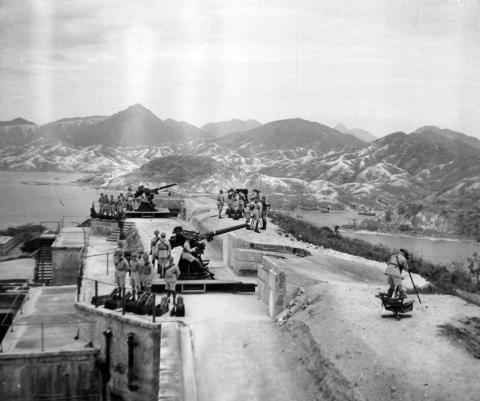
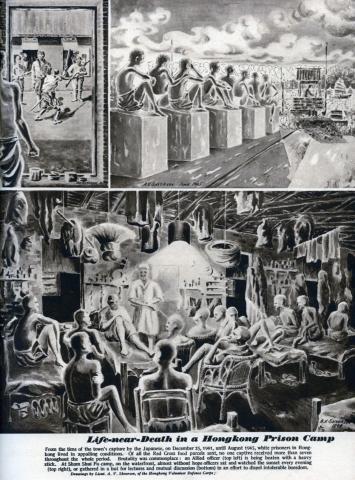
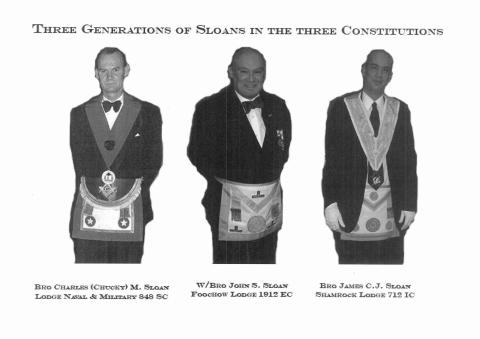
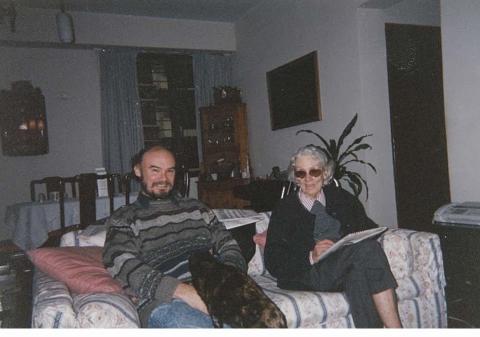
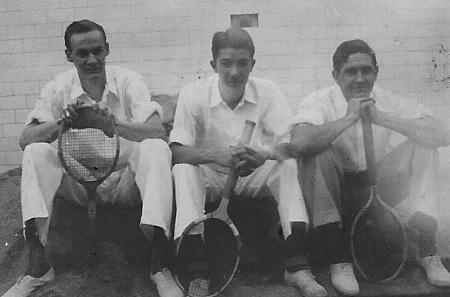
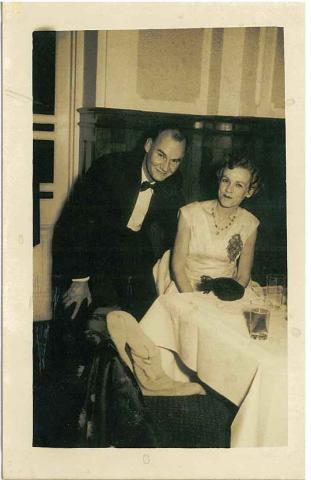
Comments
Sloan Family
Stewart - I knew of your parents as they were good friends of my own, Arthur & Irene Braudé. In fact I still have a letter from my Father dated May 1969 twice mentioneing your Father. I also know that your brother Jim became a director of my Father's trading company. It was sold in the early 1970's and I wonder where your brother is now? I've been living in France since 1992.
Jim Sloan
Dear Peter,
Thank you for your comments. I recall that we met briefly after your father's passing.
Jim retired to Portugal in the 90's shortly before the Hand Over and returned to HK last year when his health deteriorated. He now lives in the China Coast Community. He lived with my wife and I for a while but it became obvious that he needed more or less constant medical attention. If you wish to write to him please do so at:
James M. Sloan
China Coast Community Ltd
63 Cumberland Road
Kowloon Tong
Kowloon
Hong Kong